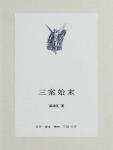Chapter 1 written in front
Due to various hidden or obvious reasons, the "Ming history craze" has swept across China since the beginning of the 20th century, and the popularity has not diminished until today, and people have even made various wonderful connections and interpretations.In addition to Meng Sen, Wu Han, Gu Cheng, Huang Renyu and other well-known names in the academy, individual amateur researchers seem to attract more attention from ordinary readers today.In this sense, the study of Ming history has indeed presented a good “ecological mechanism” in the field of Chinese dating history.Between colleges and amateurs, today we introduce a little book that is easily overlooked——.
In less than 100,000 words, it clarifies the three most entangled, complicated and far-reaching cases in the history of the Ming Dynasty, the cases of Dingjian, Hongwan, and Yigong.Before entering into the specific "case analysis", the author starts from the contradiction between imperial power and prime minister power, and ends with the "causation" of Wanli, explaining the motives of the three cases from the system level, and explaining the fuse of the three cases from the emperor level. He Xiangquan, the court and eunuchs, and the ins and outs, causes and consequences, and interrelationships of the three major cases are analyzed in detail, presenting readers with a clear and vivid three-dimensional picture of the court, government and society in the late Ming Dynasty.Later, through the continuous reversal of the verdict by the Tianqi and Chongzhen dynasties, it also showed the face of family disputes, paving the way for the Ming Dynasty to die due to party disasters and hostility.
The long delay and great influence of the three cases just reflected the political chaos in the late Ming Dynasty.Starting from this perspective, the author enables readers to see the internal disputes of the ruling class in the Ming Dynasty, and see the increasingly desolate state affairs. At the same time, it presents the system and power more concisely, which is quite brilliant.His writing is as light as it is light, easy and friendly, like a fireside chat, and he speaks eloquently.The author hopes that "through the causes and processes of the three cases, it can be clearly seen that the Ming Dynasty has made every effort to increase the imperial power over the years, and what kind of accumulated disadvantages have been produced." Limit conflicts between imperial powers.The former is the foundation that the emperors most desire under the imperial system for thousands of years, and the latter is the belief and appeal of the scholar group for political etiquette.And at this special point in time in the late Ming Dynasty, even if modern propositions such as "the awakening of intellectuals" were not used, the tragic resistance of the intellectual class to imperial power can be seen from the three cases in the late Ming Dynasty, which is of great importance to the author. Writing this book after the "Cultural Revolution" may also have practical significance.
Wen Gongyi (1915-1990), whose ancestral home was Wuchang, Hubei, and whose father was once an aide of Zhang Zhidong.Wen lived and grew up in Beijing (Ping), with few talents and names, but good at poetry and prose. After the Anti-Japanese War, the whole family fled to Hong Kong, and was introduced by Lou Shiyi to the "Hong Kong Literary Association" for publishing articles. In 1939, he joined Ta Kung Pao in Hong Kong, and was praised by Xu Zhucheng, the editor-in-chief at the time, as "a beautiful tree facing the wind and full of talent", which was appreciated by Hu Zhengzhi and others. After 1948, he settled in Chongqing.After liberation, he was ostracized for a long time because of his upright temper and trumped-up charges, so he had to stay at home.Uninhibited by common affairs, he read to his heart's content and "talked rather than wrote", occasionally writing and translating, and only for self-entertainment and not for publication. After the "Cultural Revolution", encouraged by Chongqing Publishing House, it was published in 1984, and later wrote "Eunuchs and Courts in the Ming Dynasty" (1989).In the works of Mr. Wen Gongyi, the output is astonishingly low as is the high quality, which seems to be a kind of unborn genius.His profound knowledge of literature and history and his secluded attitude make him a unique existence between academics and amateurs.
This time, Sanlian Bookstore republished the book, based on the 1984 edition of Chongqing Publishing House.The first edition of the book sold more than 200,000 copies that year, and was praised and praised by many famous authors.A Taiwanese publishing house even directly pirated the book and renamed it "Three Cases in the Late Ming Dynasty", which became an important reference material for the famous scholar Huang Renyu's writing.

